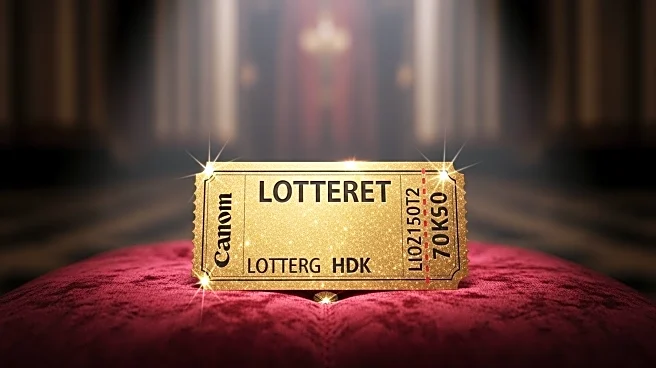What's Happening?
The Seven Bridges Revocable Trust of Fredericksburg, Texas has claimed over $410 million, before taxes, from the one-time payment option of the nearly $1.8 billion Powerball jackpot. The winning ticket
was drawn on September 6, and the trust opted for anonymity, a common practice among lottery winners to maintain privacy. The trust expressed gratitude and plans to share the winnings with family and community. The Texas Lottery announced this milestone, marking the largest prize awarded in Texas Lottery history. The other half of the jackpot was claimed by an anonymous player in Missouri in late September. The Texas winner chose personally meaningful numbers for the draw, deviating from their usual random selection, which led to their unexpected win.
Why It's Important?
This event underscores the significant impact of lottery winnings on individuals and communities. The anonymity provided by trusts allows winners to manage their newfound wealth discreetly, potentially reducing public scrutiny and personal security risks. The substantial prize also highlights the economic influence of lotteries, which can lead to increased consumer spending and charitable contributions. The Texas Lottery benefits from heightened public interest and participation, potentially boosting state revenue. The story also illustrates the unpredictable nature of lottery games, where personal choices can lead to life-changing outcomes.
What's Next?
The trust plans to enjoy and share the winnings with those special to them and who serve their community, indicating potential philanthropic activities. The Texas Lottery may experience increased ticket sales due to heightened public interest following the announcement of such a large prize. Other lottery participants might be inspired to use personal numbers, hoping for similar success. The anonymity of the winner may lead to discussions on privacy and security for lottery winners, possibly influencing future policies on winner disclosure.
Beyond the Headlines
The use of trusts for anonymity raises ethical questions about transparency and accountability in lottery winnings. While it protects winners, it may also obscure the flow of large sums of money, affecting public trust in lottery systems. The cultural significance of lotteries as a form of entertainment and hope for many Americans is reinforced by stories like this, which capture public imagination and highlight the allure of sudden wealth.











